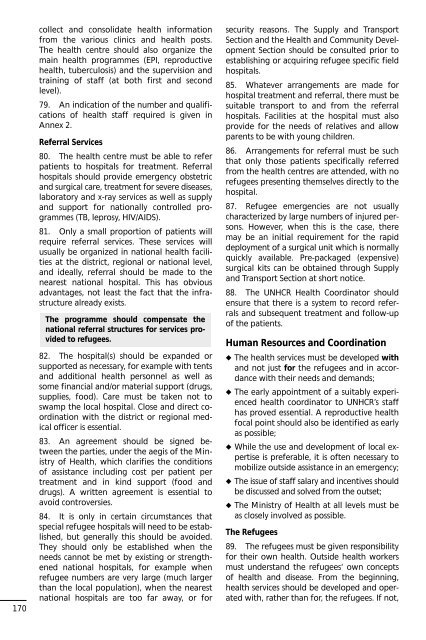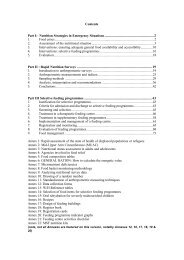UNHCR Handbook for Emergencies - UNHCR eCentre
UNHCR Handbook for Emergencies - UNHCR eCentre
UNHCR Handbook for Emergencies - UNHCR eCentre
You also want an ePaper? Increase the reach of your titles
YUMPU automatically turns print PDFs into web optimized ePapers that Google loves.
170<br />
collect and consolidate health in<strong>for</strong>mation<br />
from the various clinics and health posts.<br />
The health centre should also organize the<br />
main health programmes (EPI, reproductive<br />
health, tuberculosis) and the supervision and<br />
training of staff (at both first and second<br />
level).<br />
79. An indication of the number and qualifications<br />
of health staff required is given in<br />
Annex 2.<br />
Referral Services<br />
80. The health centre must be able to refer<br />
patients to hospitals <strong>for</strong> treatment. Referral<br />
hospitals should provide emergency obstetric<br />
and surgical care, treatment <strong>for</strong> severe diseases,<br />
laboratory and x-ray services as well as supply<br />
and support <strong>for</strong> nationally controlled programmes<br />
(TB, leprosy, HIV/AIDS).<br />
81. Only a small proportion of patients will<br />
require referral services. These services will<br />
usually be organized in national health facilities<br />
at the district, regional or national level,<br />
and ideally, referral should be made to the<br />
nearest national hospital. This has obvious<br />
advantages, not least the fact that the infrastructure<br />
already exists.<br />
The programme should compensate the<br />
national referral structures <strong>for</strong> services provided<br />
to refugees.<br />
82. The hospital(s) should be expanded or<br />
supported as necessary, <strong>for</strong> example with tents<br />
and additional health personnel as well as<br />
some financial and/or material support (drugs,<br />
supplies, food). Care must be taken not to<br />
swamp the local hospital. Close and direct coordination<br />
with the district or regional medical<br />
officer is essential.<br />
83. An agreement should be signed between<br />
the parties, under the aegis of the Ministry<br />
of Health, which clarifies the conditions<br />
of assistance including cost per patient per<br />
treatment and in kind support (food and<br />
drugs). A written agreement is essential to<br />
avoid controversies.<br />
84. It is only in certain circumstances that<br />
special refugee hospitals will need to be established,<br />
but generally this should be avoided.<br />
They should only be established when the<br />
needs cannot be met by existing or strengthened<br />
national hospitals, <strong>for</strong> example when<br />
refugee numbers are very large (much larger<br />
than the local population), when the nearest<br />
national hospitals are too far away, or <strong>for</strong><br />
security reasons. The Supply and Transport<br />
Section and the Health and Community Development<br />
Section should be consulted prior to<br />
establishing or acquiring refugee specific field<br />
hospitals.<br />
85. Whatever arrangements are made <strong>for</strong><br />
hospital treatment and referral, there must be<br />
suitable transport to and from the referral<br />
hospitals. Facilities at the hospital must also<br />
provide <strong>for</strong> the needs of relatives and allow<br />
parents to be with young children.<br />
86. Arrangements <strong>for</strong> referral must be such<br />
that only those patients specifically referred<br />
from the health centres are attended, with no<br />
refugees presenting themselves directly to the<br />
hospital.<br />
87. Refugee emergencies are not usually<br />
characterized by large numbers of injured persons.<br />
However, when this is the case, there<br />
may be an initial requirement <strong>for</strong> the rapid<br />
deployment of a surgical unit which is normally<br />
quickly available. Pre-packaged (expensive)<br />
surgical kits can be obtained through Supply<br />
and Transport Section at short notice.<br />
88. The <strong>UNHCR</strong> Health Coordinator should<br />
ensure that there is a system to record referrals<br />
and subsequent treatment and follow-up<br />
of the patients.<br />
Human Resources and Coordination<br />
◆ The health services must be developed with<br />
and not just <strong>for</strong> the refugees and in accordance<br />
with their needs and demands;<br />
◆ The early appointment of a suitably experienced<br />
health coordinator to <strong>UNHCR</strong>’s staff<br />
has proved essential. A reproductive health<br />
focal point should also be identified as early<br />
as possible;<br />
◆ While the use and development of local expertise<br />
is preferable, it is often necessary to<br />
mobilize outside assistance in an emergency;<br />
◆ The issue of staff salary and incentives should<br />
be discussed and solved from the outset;<br />
◆ The Ministry of Health at all levels must be<br />
as closely involved as possible.<br />
The Refugees<br />
89. The refugees must be given responsibility<br />
<strong>for</strong> their own health. Outside health workers<br />
must understand the refugees‘ own concepts<br />
of health and disease. From the beginning,<br />
health services should be developed and operated<br />
with, rather than <strong>for</strong>, the refugees. If not,



